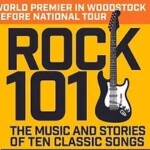Artist: Richard Hell & The Voidoids
Album: Richard Hell & The Voidoids Destiny Street Complete
Label: Omnivore Recordings
Release Date: 1.22.21

Destiny Street must have seemed like a dead end to Richard Hell & The Voidoids in 1982. Unsatisfied with the art punk originators’ second and final album, perhaps troubled by its rather thin, muffled sound or its flailing chaos, Hell wanted desperately to remix the wild and woolly successor to 1977’s seminal Blank Generation debut. Unfortunately, the original 24-track masters went missing, preventing Hell from performing the necessary operation.
As luck would have it, in the early 2000s, Hell stumbled upon a cassette from 1981 with all the LP’s rhythm tacks, which allowed him to install thrilling new guitar forays and urgent vocals in 2009’s Destiny Street Repaired tune-up. Three of the four original 24-track masters were then unearthed in 2019, and Hell finally got his wish, as he teamed with Nick Zinner of the Yeah Yeah Yeahs to make the “Remixed” set of Hell’s dreams.
“I’ve finally taken it all the way, and at this late date the album now moves me,” writes Hell in the refreshingly candid, almost confessional liner notes – fleshed out with vintage photos and memorabilia, plus detailed credits – accompanying Destiny Street Complete. Jammed into the two-CD package, its release timed to celebrate the 40th anniversary of its creation, which actually occurred in 1981, are the three versions of the LP, plus a trunk full of demos recorded between 1978-1980. Hell’s scribblings revisit the band’s brief, burned-out history, revealing his mounting frustrations, self-doubt and growing disinterest with touring, record labels and music in general. At one point, Hell thanks his Destiny Street bandmates – guitarists Robert Quine and Naux, and drummer Fred Maher – for their patience with him during its conception. Hell’s emotions practically scream from the pages.
As for Destiny Street itself, redemption is close at hand. Still a hot, feral mess, the gloriously shambolic original LP comes off as more vital and electrifying than Hell’s misgivings would suggest. While the dizzying single “The Kid With the Replaceable Head” spins excitedly and the flying merry-go-‘round “Lowest Common Dominator” gathers momentum, the menacing anti-drug track “Ignore That Door” yelps and growls in the dark like a caged Iggy and The Stooges, a stomping “I Can Only Give You Everything” revels in ‘60s garage-rock euphoria and rough folk-rock ballads “Time” and “Going Going Gone” bleed out poignantly. No apologies are needed for its supposed flaws. Destiny Street wouldn’t be nearly as interesting without them.
Imperfect, but brimming with passion, its incisive poetry spit out bites of the rotting Big Apple that was New York City in the late ’70s and early ‘80s. Destiny Street spoke of the alienation, anxiety, despair and longing that came with living in a broken city. It was all over the map stylistically, the silvery guitar coils and propulsive disco groove of “Downtown at Dawn” driving the point home with emphasis. And if “Repaired” offered fuller, richer renditions of these long-forgotten jewels, adding a twinkle to “Going Going Gone” and putting some meat on the bones of “The Kid With the Replaceable Head” and the primitive, swaggering “I Gotta Move,” the remixes bring enhanced clarity and intensity. Feeling reborn, “Lowest Common Dominator” becomes cyclonic, slamming with increased force as Naux intermittently emits slightly abrasive, alley-cat yowls of guitar. With its softened jangle, “Time” turns wistful, “Staring In Her Eyes” gains speed and power and the taut funk of the original title track slows somewhat and blooms invitingly in its new habitat.
Sifting through the demos, the nervy, shaken Radar single of “The Kid With the Replaceable Head” is infectiously raw and jittery, as is a quick and dirty “Ignore That Door.” Both are more in keeping with coarse punk aesthetics, with Funhunt” veering into off-kilter, frenzied jazz and the progressive “Smitten” traveling Television’s cool, melodic circuitry. The most affecting moment here, however, is the stripped-down take on “Time” played at a 2004 Quine memorial, with Hell’s weathered singing backed only by Ivan Julien on 12-string guitar. As a bonus track, it’s hard to beat that. Destiny Street, as it turns out, is a vibrant, lively place that never sleeps.
—Peter Lindblad







Be the first to comment!